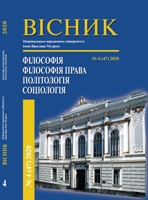ФЕНОМЕН ГЕРОЇЗМУ У КОНТЕКСТІ ПАТРІОТИЧНОГО ВИХОВАННЯ
PHENOMENON OF HEROISM IN THE CONTEXT OF PATRIOTIC EDUCATION
Author(s): Vasyl Andriyovich KrotiukSubject(s): History of Philosophy, Social Philosophy, Nationalism Studies, Politics and Identity
Published by: Національний юридичний університет імені Ярослава Мудрого
Keywords: hero; heroism; heroic; patriotism;national identity;
Summary/Abstract: The Problem setting. Social and political processes, economic and state-building transformations in our country, and the military and political situation around Ukraine, led to the return of the theme of heroism to scientific discourse, rethinking the use of heroic potential in shaping patriotic consciousness of citizens, national identity of Ukrainians. The problem of heroism is connected with the evaluation of the activity not only of individual historical personalities or even whole generations of the people, but also with its fixation in the cultural memory of mankind. The phenomenon of the heroic is in the range of research interests of many social sciences and in the focus of attention of educational institutions.The moral significance of the heroic is important, because this concept has a significant educational potential, contributes to the formation of humane, noble goals, active citizenship and patriotismRecent research and publications analysis. The essence of the category of the heroic was explored by J. Bruno, J. Vico, G.V. Hegel, T. Carlyle, D. Campbell, F. Nietzsche, K. Jung and others. The formation of the phenomenon of heroism is outlined in the works of G. Skovoroda, P. Yurkevich, T. Shevchenko, I. Franko, L. Ukrainka, M. Hrushevsky, D. Dontsov, V. Lypynsky, G. Vashchenko, V. Sukhomlynsky, S. Krymsky, V. Baranivsky, O. Khmilyar.In the Western philosophical thought of the XX century the understanding of the heroic can be divided into four areas. The first direction continues to develop the concept of T. Carlyle (understanding the hero as a «superman»), the second considers the hero as a social myth and tool of psychoanalysis, for the third direction the hero is a phenomenon of social consciousness, a regulator of social life. The fourth is the concept of degeneration, the representatives of which reject the existence possibility of the heroic in a postmodern society.Paper objective. The one of the most important phenomena in a range of scientific interests of philosophy, psychology, ethics and history was discussed. The essence of concepts «hero», «heroism» based on the analysis of philosophical literature was explored. The description of the history of the phenomenon of heroism in different sources was made. The connection of aforementioned phenomena could be traced with such concepts as «patriotism» and «identity», the motives of selfless devotion and death, variants coexistence of different concepts of «hero» were distinguished, specific signs of heroic action were demonstrated. It reflected social and cultural settings of a specific historical period and indicated the variability of ideas about the status of this phenomenon. It was defined that people constantly were coming back to that category and fixing with that fact the highest level of spiritual beauty and activity of personality, which was able to give hope and to lead, to provoke the desire to imitate.The attention in the research work was focused on the philosophical idea ofthe twentieth century because at that period there was intensification of scientific research for clarification of those concepts.Conclusions of the research. Modern Ukrainian patriotism must be the result of the practical realization of a responsible sense of citizenship as an integrated quality of a modern man. Forming patriotic feelings in Ukrainian youth, teachers should rely on such basic characteristics of patriotism as the socially consolidating nature of its manifestation, civic responsibility and active position of all members of the community. As a result, patriotic feelings for Ukrainian youth should become not only a stable and conscious identification with their native country, but also a readiness for responsible and effective civic action.
Journal: Вісник НЮУ імені Ярослава Мудрого. Серія: Філософія, філософія права, політологія, соціологія
- Issue Year: 47/2020
- Issue No: 4
- Page Range: 58-71
- Page Count: 14
- Language: Ukrainian

